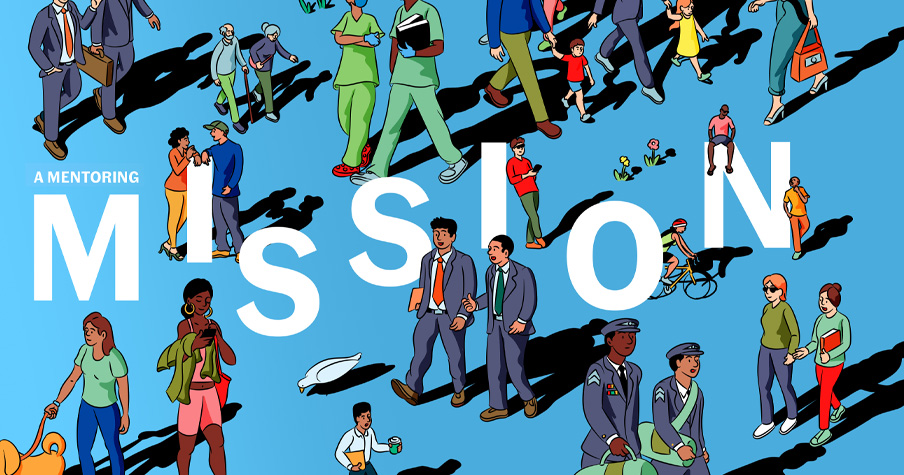
Illustrations by Liam Eisenberg
When Cesar Gonzalez arrived in the small town of Cambridge on Maryland’s largely rural Eastern Shore in 2013, the Seventh-day Adventist Church he was assigned to pastor had a reputation for insularity among the town’s civic and governmental leaders.
“My work was very clear,” he recalls now. “Grow the numbers, and change the community’s perception.”
His instincts told him that he needed to be a community pastor rather than a church pastor, one dedicated to serving as much outside of the church as inside. “I did not know anyone who was doing this kind of work, or if I was on the right path. And it didn’t look anything like evangelism,” he said.
Two years into Gonzalez’s journey, Ignacio Goya, the new field director for the Chesapeake region of Adventist Community Services (ACS), visited the Cambridge church. ACS is one of the official community outreach ministries of the Adventist Church. Gonzalez asked Goya for funding to support his idea: a six-week summer camp for children who experienced food insecurity when school lunch programs were not available. The camp would serve breakfast, lunch, and snacks to take home at the end of the day.
“Ignacio said, ‘We’ll find the money,’” Gonzalez said. “But he never offered any. I asked him again and he told me ‘The money will come; when you have vision and you understand the needs of the community, the money will follow.’”
Gonzalez dug in and made his case to governmental, not-for-profit agencies, and other community leaders. Support began to avalanche. The camp grew in size and scope. Even during the COVID-19 pandemic, the camp stayed open, thanks to some angel donations.
Now pastoring a church in Frederick, Maryland, across the Chesapeake Bay and an hour’s drive west of Baltimore, Gonzalez is continuing his work in a different community with different needs.
“Ignacio was a mentor,” he said. “I’d never had anyone tell me I was on the right track, and he did. And that made a huge difference in my confidence and my approach to ministry.”
“Ignacio said, ‘We’ll find the money.’ But he never offered any. I asked him again and he told me ‘The money will come; when you have vision and you understand the needs of the community, the money will follow.’”

A broader vision
Goya served with ACS in Maryland from 2015 until 2022, where he initiated the “Love Your Neighborhood” programs, created to teach Adventist ministers how to manage service projects in their local churches that directly impact their surrounding communities. Those programs brought the Chesapeake ACS into partnership with organizations from the not-for-profit and governmental sectors, and addressed some of the most pressing issues of the day, including the pandemic and the Afghan refugee crisis.
Goya earned his undergraduate degree from Complutense University in Madrid and his M.Div. from the Seventh-day Adventist Seminary (SDATS) at Andrews University in Michigan, where he currently is a Doctor of Missiology candidate. He also has extensive international experience as a country director working with the Adventist Development and Relief Agency (ADRA), implementing programs for economic development, food security, mental and physical health, education, disaster response, and immigration, among others.
This fall, Goya is bringing his multi-faceted experience into a new role as the program director for a nascent effort in the Adventist Church: the Center for Community Change (CCC). Funded by Lilly Endowment Inc.’s Pathways for Tomorrow Initiative and housed at SDATS, CCC has roots in the Chesapeake ACS model, focused primarily on mentorship experiences for pastors and seminary students.
In Pathways Phase I, SDATS received funding used to conduct a survey of Adventist pastors in North America to gauge their needs; over half identified engaging with local communities as their greatest challenge.
“The findings clearly identified the pastors’ need to re-engage,” said Cedric Vine, Ph.D., associate professor of New Testament and Director of the Master of Arts (Religion) Program and Seminary Affiliations and Extensions at Andrews. “Many pastors wanted to serve the community, to do community service projects that would show the love of Christ to them, but there was a lack of understanding about how to implement it correctly or how to even start.”
The survey results were not altogether unsurprising, said Vine, whose doctorate in Biblical Studies is from the University of Sheffield in the United Kingdom. In recent decades, the North American Adventist Church’s storied history of societal engagement dating back to the 19th century – including anti-slave trade activities, temperance advocacy, and a strong educational network – had faltered. Over several generations, much of society has seemed to “agree with” the Adventist Church on the importance of individual and community health and development, Vine noted. Governmental and not-for-profit organizations expanded to meet the needs, infringing on the traditionl role of churches as centers of community building. And in more recent years, Adventist congregants also began moving out of the urban centers, further hampering “the capacity of our central urban churches to address not just personal issues in the congregations, but also wider societal issues.”
The research led to a Phase II grant for nearly $1 million to strengthen the Seminary’s capacity to prepare pastors for work in urban environments; the funds supported the creation of an Urban Ministry concentration in the M.Div. program, established an Urban Clinical Pastoral Education program, introduced an online M.Div. program to help reduce student indebtedness, and developed a library database of Black, Indigenous and People of Color (BIPOC) biblical and theological scholarship.
For Phase III, the Seminary submitted a successful proposal in 2022 for operational funding for five years to initiate the Center for Community Change (CCC), based at the SDATS with the goal to train ministers to “guide pastors and their teams through the process of character building, expanding knowledge and real-life experiences, and securing financial resources to fund and implement evidence-based approaches to improve the lives of the residents in their communities,” according to the Pathways grant application.
Through individualized mentoring and “stretch experiences” for pastors, lay leaders, and the teams engaged in community-level projects, the CCC aims to create “contextualized innovative solutions that address felt community needs and their root causes,” according to the grant proposal.
“We were seeing interest among seminarians in joint M.Div. and Master’s-level programs in community development or Master of Social Work, but not many of them could do it because it extends the program considerably,” said Vine, who now also holds the title of Public Relations Coordinator for CCC. “The efforts Ignacio pioneered in the Chesapeake Conference led us to think that perhaps we could develop these competencies post-graduation, to recent graduates or pastors already in the field.”
“We’ve had no problem recruiting pastors for this effort. Our problem is we have more wanting the mentoring than we have capacity for at the moment.”

Mentorship, collaboration, and “stretch experiences”
The first cohort of 64 pastors began in September; it includes the Chesapeake region’s Cesar Gonzalez and others previously mentored by Goya. A distinctive feature of the program is its strong connections back to the pastors’ home regions, to ensure alignment.
The Center has fully integrated its educational priorities and teaching with Adventist educational, administrative, and healthcare organizations. The seminary at Andrews is the locus, providing mentoring and experiences made accessible by adjusting entry requirements and reducing costs to churches for participating in the program.
The North American Division (NAD), the administrative arm of the General Conference of Seventh-day Adventist churches in North America, has established a three-fold focus on mentoring (a discipling process), multiplying (the process of sharing the gospel), and media (information sharing). The CCC will interact with NAD’s InMinistry Center to offer hybrid learning platforms, and with Adventist Community Services, the official community outreach ministry of the Church; its tools will be adapted to CCC to provide some of the academic training.
CCC also has forged collaborative partnerships with highly regarded Adventist healthcare providers, including AdventHealth, Adventist Health, and Kettering Health. The health networks will provide technical support, and with the CCC will help establish mature projects to improve the health and well-being of the communities served by the participating churches.
Finally, the Center will provide three levels of support that require pastors to participate in challenging “stretch experiences:” Academic training in community development theory and practice; mentorship for collaborative community projects, including seed funding of up to $20,000 to facilitate solutions locally; and reflection and dissemination – essentially a project report that will count as an assessment for a Certificate in Community Development from SDATS.
“We’ve had no problem recruiting pastors for this effort,” said Vine, noting that the first cohort will be followed annually by others. “Our problem is we have more wanting the mentoring than we have capacity for at the moment. And we’ve got people around the world saying they would like us to offer it to them, too. We hope that our work will compel other partners to support the project financially, commensurate with what they see in community impact.”
“Then he bade them: Follow me.”
For Adventists the world over, the visions and writings of Ellen Gould White are touchstones of the faith. The sometimes controversial late 19th century co-founder of the Seventh-day Adventist Church preached frequently and published several influential books, including The Ministry of Healing (1905). In that book, she wrote: “Christ’s method alone will give true success in reaching the people. The Saviour mingled with men as one who desired their good. He showed His sympathy for them, ministered to the needs and won their confidence. Then He bade them, ‘Follow me.’”
Those words are guideposts for Goya and the CCC. “You cannot cut and paste in this work,” he said. “You can teach principles and embed them in a leader, but ultimately you want these leaders to be open to learning, to find the trust to follow Jesus, and to share that learning back. There is no single way forward, except to learn together and pray to God for wisdom.
“The CCC and Lilly are making it possible to transform the service and love of Christ in our communities.”




























